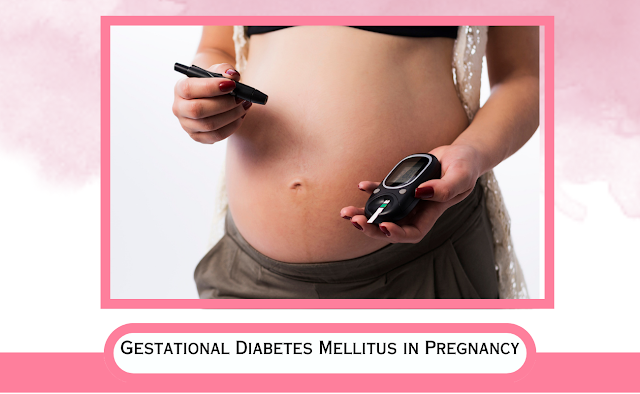Cause of Gestational Diabetes Mellitus (GDM) and its Symptoms - Dr. Deepti Asthana
Gestational Diabetes Mellitus in Pregnancy
Gestational Diabetes Mellitus (GDM) is a form of diabetes in pregnant women who previously did not have diabetes. It is a significant health issue affecting approximately 16% of pregnancies worldwide, with higher prevalence in specific populations. GDM poses risks for both the mother and the baby, and it is essential to manage it properly to reduce adverse outcomes. This blog post aims to provide a comprehensive overview of GDM, including its causes, diagnosis, management, and possible complications.
What causes Gestational Diabetes Mellitus (GDM)?
GDM is caused by a combination of hormonal and metabolic changes during pregnancy. Hormones such as human placental lactogen, progesterone, and cortisol produced by the placenta, can reduce insulin sensitivity and cause insulin resistance. Insulin resistance, in turn, can lead to high blood glucose levels in pregnant women who do not have enough insulin to manage the increased demand.
Risk Factors for GDM
There are several risk factors for GDM, including:
- Age above 25 years
- Obesity or being overweight
- A history of GDM in a previous pregnancy
- Family history of diabetes
- A history of polycystic ovary syndrome (PCOS)
- A history of giving birth to a baby weighing more than 4.5 kg (10 pounds)
- A history of unexplained stillbirth or neonatal death
- Certain ethnic groups include South Asian, African, Middle Eastern, and Hispanic.
Diagnosis of GDM
The diagnosis of GDM is usually made between 24-28 weeks of pregnancy. Pregnant women are routinely screened for GDM with an oral glucose tolerance test (OGTT). An OGTT involves a fasting blood glucose level test, followed by drinking a glucose solution and a blood glucose level test after one hour and two hours. If the blood glucose level exceeds the recommended thresholds, a diagnosis of GDM is made.
GDM Management
The primary goal of managing GDM is to maintain normal blood glucose levels to prevent adverse outcomes for both the mother and the baby. GDM can be managed with lifestyle modifications, medications, or both.
Lifestyle Modifications
Lifestyle modifications are the first-line approach to managing GDM. They include:
- Healthy eating: A well-balanced diet with carbohydrates, proteins, and fats distributed throughout the day can help manage blood glucose levels. Pregnant women with GDM may need to work with a dietician to create a suitable meal plan.
- Regular physical activity: Physical activity can help improve insulin sensitivity, reduce blood glucose levels, and promote overall health. Pregnant women should engage in moderate-intensity exercise for at least 30 minutes a day, most days of the week, unless there are medical reasons against it.
- Blood glucose monitoring: Pregnant women with GDM should monitor their blood glucose levels regularly to ensure they are within the recommended range. Blood glucose targets may vary depending on the individual circumstances, and women should consult their healthcare provider for guidance.
Medications
If lifestyle modifications are insufficient in managing GDM, medications may be prescribed. The most commonly used medications are insulin and metformin.
Insulin is a hormone that helps regulate blood glucose levels. Pregnant women with GDM may need insulin injections to manage their blood glucose levels. Insulin does not cross the placenta and is safe for the baby. It is usually started with a low dose and adjusted as needed.
Metformin is an oral medication that helps reduce insulin resistance and blood glucose levels. It is not recommended during the first trimester of pregnancy but may be prescribed later.
Possible Complications of GDM
GDM poses several risks for both the mother and the baby, including:
Complications for the Mother
- Preeclampsia: GDM increases the risk of developing preeclampsia, a potentially life-threatening condition characterized by high blood pressure and damage to organs such as the kidneys and liver.
- Cesarean section: Pregnant women with GDM are more likely to deliver by cesarean section due to complications such as macrosomia (large baby size), prolonged labor, and fetal distress.
- Type 2 diabetes: Women with a history of GDM are at a higher risk of developing type 2 diabetes later in life.
Complications for the Baby
- Macrosomia: High blood glucose levels in pregnant women with GDM can lead to a large baby size (macrosomia), which can cause birth injuries such as shoulder dystocia and increase the likelihood of cesarean section delivery.
- Hypoglycaemia: Babies born to mothers with GDM may have low blood glucose levels at birth due to the high insulin levels they develop in the womb. Hypoglycaemia can cause seizures and brain damage if left untreated.
- Respiratory distress syndrome: Babies born to mothers with GDM have a higher risk of developing respiratory distress syndrome, in which the lungs do not function properly due to lack of surfactant. This substance keeps the air sacs open.
- Type 2 diabetes: Babies born to mothers with GDM have a higher risk of developing type 2 diabetes later in life.
In conclusion, managing Gestational Diabetes Mellitus (GDM) is crucial for a healthy pregnancy and delivery. As an experienced Obstetrician in Gurgaon and the owner of Kalosa Obs & Gynae Clinic, Dr. Deepti Asthana is dedicated to providing the highest quality care to pregnant women with GDM. She understands the importance of regular monitoring and follow-up appointments to ensure the best possible outcomes for both the mother and the baby. Her expertise and guidance can help women with GDM receive the support and treatment they need for a healthy pregnancy and delivery. If you're facing GDM during your pregnancy, Dr. Asthana is here to help you navigate this challenge with compassion and personalized care.



Comments
Post a Comment